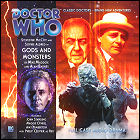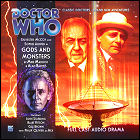 The Doctor is trapped in an unfamiliar realm with Fenric, once again playing chess against the elder god. The TARDIS, once again its original shade of blue, materializes with Ace, Hex, Aristedes and Private Morgan aboard, and they promptly run into trouble: a Persian prince with an enchanted hammer, pursued by Fenric’s hordes of haemovores. Ace, familiar with Fenric’s games, goes rogue with the help of the prince’s hammer, while Hex finds himself protecting Weyland’s shield. Fenric sends Aristedes and Morgan away with a time storm, isolating the Time Lord from his small army of pawns. But only when the blacksmith to the gods, Weyland himself, appears, does the Doctor realize that he isn’t one of the players in this game. He isn’t even one of the pieces critical to the game, but Hex is – and the bearer of Weyland’s shield may become a sacrifice in the endgame.
The Doctor is trapped in an unfamiliar realm with Fenric, once again playing chess against the elder god. The TARDIS, once again its original shade of blue, materializes with Ace, Hex, Aristedes and Private Morgan aboard, and they promptly run into trouble: a Persian prince with an enchanted hammer, pursued by Fenric’s hordes of haemovores. Ace, familiar with Fenric’s games, goes rogue with the help of the prince’s hammer, while Hex finds himself protecting Weyland’s shield. Fenric sends Aristedes and Morgan away with a time storm, isolating the Time Lord from his small army of pawns. But only when the blacksmith to the gods, Weyland himself, appears, does the Doctor realize that he isn’t one of the players in this game. He isn’t even one of the pieces critical to the game, but Hex is – and the bearer of Weyland’s shield may become a sacrifice in the endgame.
written by Mike Maddox and Alan Barnes
directed by Ken Bentley
music by Howard CarterCast: Sylvester McCoy (The Doctor), Sophie Aldred (Ace), Philip Olivier (Hex), Maggie O’Neill (Lysandra Aristedes), Amy Pemberton (Sally Morgan), John Standing (Fenric), Blake Ritson (Hurmzid), Gus Brown (Weyland), Tim Treloar (The Ancient One)
Notes: Fenric was first encountered on TV in 1989’s The Curse Of Fenric, though the Doctor claimed to be aware of Fenric’s manipulations as early as Dragonfire (1987) and Silver Nemesis (1988). The novels carried forward the idea of the Doctor battling Lovecraftian “elder gods” and established the notion that they were powerful beings left over from a previous iteration of the universe; in the Missing Adventures novel Twilight Of The Gods, such enemies as the Great Intelligence (known by its elder god name, Yog-Sothoth), the Gods of Ragnarok (The Greatest Show In The Galaxy) and Fenric were part of a pantheon of enormously powerful beings. Big Finish has carried that idea forward from there: the seventh Doctor’s recent series of battles with elder goes include the Karnas’Koi (Lurkers At Sunlight’s Edge), the Mi’en Kalarash (House Of Blue Fire), Moloch, “Albert”, and “Peggy” (Protect And Survive), and arguably earlier stories could be part of this long battle between the Doctor and the gods, all the way back to Primeval (2001), which implied that the fifth Doctor’s defeat of the godlike being Kwundaar at Traken had “sounded a dinner bell” for other ancient and powerful beings.
Timeline: after Black And White and before Afterlife
LogBook entry and TheatEar review by Earl Green
Review: A story on a mythic scale taking place in a setting free from the shackles of mere physics, Gods And Monsters can be a little bit hard to keep up with at times, and prior knowledge of both The Curse Of Fenric and the past nine or ten seventh Doctor audio stories (at least those not involving Klein in any way) are practically pre-requisites. Big Stuff happens here.
But some of it’s so big that it’s almost too big. The Curse Of Fenric worked well because it made Ace a  pawn in a fight being waged between the Doctor and an immensely powerful being; Gods And Monsters puts forward the idea that even the Doctor may be the pawn of another player. That’s a concept that threatens to unravel Doctor Who or any other piece of fiction: by eliminating the main characters’ free will, their motivation is also called into question. One might as well make the characters aware that they’re fictional characters and acknowledge the author as the godlike being pushing them around the character. Perhaps the safest reading of this story is that Weyland has been prodding the seventh Doctor along in his travels; to assign Weyland responsibility for everything the Doctor has ever done undermines too much of the series’ premise.
pawn in a fight being waged between the Doctor and an immensely powerful being; Gods And Monsters puts forward the idea that even the Doctor may be the pawn of another player. That’s a concept that threatens to unravel Doctor Who or any other piece of fiction: by eliminating the main characters’ free will, their motivation is also called into question. One might as well make the characters aware that they’re fictional characters and acknowledge the author as the godlike being pushing them around the character. Perhaps the safest reading of this story is that Weyland has been prodding the seventh Doctor along in his travels; to assign Weyland responsibility for everything the Doctor has ever done undermines too much of the series’ premise.
The other biggie here is that Hex learns of his fate and hands himself over to it without questions (not that he really has much choice in the matter – there’s that pesky free will thing again). It’s quite a pity: Hex had become (in the absence of Evelyn) my favorite Big Finish original companion, if only because he never quite attained the state of being unflappable. Removing him from the lineup is a bold step, though it restores the “angsty Ace” status quo (something which the Ace-plus-Hex “era” had thankfully shed). Still, the end of the story seems to drop a hint that all is not as it seems…

